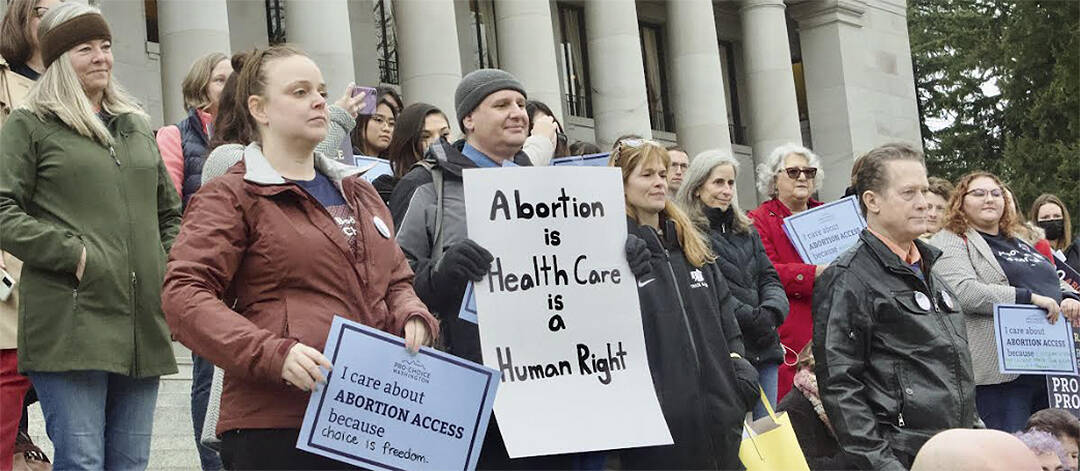Mary Le Nguyen stood in front of 70 abortion-rights activists on the Capitol steps in Olympia for a “reproductive freedom rally” in early January, and she shared her story of being a survivor of sexual abuse.
About 15 anti-abortion activists protested across the street. They wore bright red t-shirts and held signs that showed photos of fetuses 10 weeks old. “Am I human?” some of the signs asked.
“This is not about power shifting from here to here. I want people to like us to have the power,” Nguyen said, as she protested with Pro-Choice Washington. “I want us all to be more powerful, but that means we need to slow down together and see that reproductive justice is more than just about abortions.”
This legislative session marks the first since Roe vs. Wade was overturned by the U.S. Supreme Court, and House Democrats say they want to pass bills protecting abortion rights.
One would need voter approval. Senate Joint Bill 8202, sponsored by Sen. Karen Keiser, D-Des Moines, proposes amending the state Constitution to guarantee an individual’s right to have an abortion or choose contraception. It needs a two-thirds majority in The House and Senate before being placed on a statewide ballot. “We need to face the potential consequence of not having a constitutional guarantee for reproductive freedom,” Keiser said.
Gov. Jay Inslee attended his first bill hearing of the legislative session in support of SJR 8202. “A woman’s right of choice is so fundamental, in the most intimate decision of her life, it cannot be left to the whims of who happens to sit on the bench, or who happens to sit in the Legislature,” Inslee said.
However, a large number of people across the state signed up to oppose the measure at its public hearing. For online testimony, 309 people signed on in favor, and 608 signed on in opposition.
“I gave birth to a beautiful daughter who is now 27 years old. I can’t imagine this world without my daughter, and I do not live with the regret of ending a life,” said Julie Barrett, president of Conservative Ladies of Washington.
But Vicki Lowe, from the state’s American Indian Health Commission, said: “This is not a decision to be made by the government. I never thought to think my children and grandchildren would have fewer rights than I did. Reproductive freedom is about choosing what happens to our bodies.”
Cost sharing
Insurance policies that cover abortion would be required to cover the entire cost of the procedure under provisions of another bill before the legislature.
“This bill is about removing barriers to access to abortion services, regardless of the ability to pay,” said Annette Cleveland, D-Vancouver, the bill’s main sponsor. Senate Bill 5242 would require health plans issued or renewed after Jan. 1, 2024, to provide abortion services without cost-sharing, said staff of the committee Greg Attanasio.
Speaking against the bill was Julie Barrett, founder of Conservative Ladies of Washington. She said if cost-sharing is eliminated for abortion services, someone is going to have to pay for it, whether it is taxpayers, people receiving medical funding or people using insurance coverage. “We do not have endless funds to draw from the citizens of Washington state,” she said. “It is wrong for taxpayers and those using private insurance to have to shoulder the cost of abortion.”
But Alexa Brenner, an organizer for Planned Parenthood Alliance Advocates, said she supports the bill because if a patient’s portion of the bill is too high, they then are faced with difficult financial decisions. “The thought of having to come up with an extra two, three, four hundred dollars overnight can cause some panic. It’s a barrier to care.”
Shields for businesses
Employers will receive tools against retaliation from states with anti-abortion laws if Senate Bill 5260 is passed.
Sen. Karen Keiser, D-Des Moines, said, “I thought perhaps Washington state should try and create a safe harbor for the companies in our state who are trying to help their employees in anti-abortion states.” Keiser said she worked on SB 5260 because she has seen states like Florida and Texas who threatened retaliation against companies who offered reimbursement for travel costs to employees who sought out-of-state abortion services. The bill would allow employers to recover costs associated with an out-of-state judgment.



